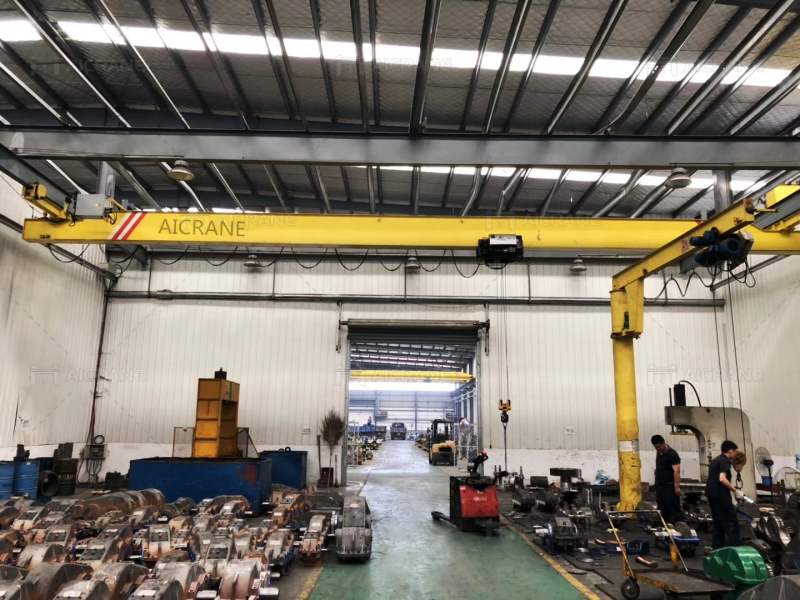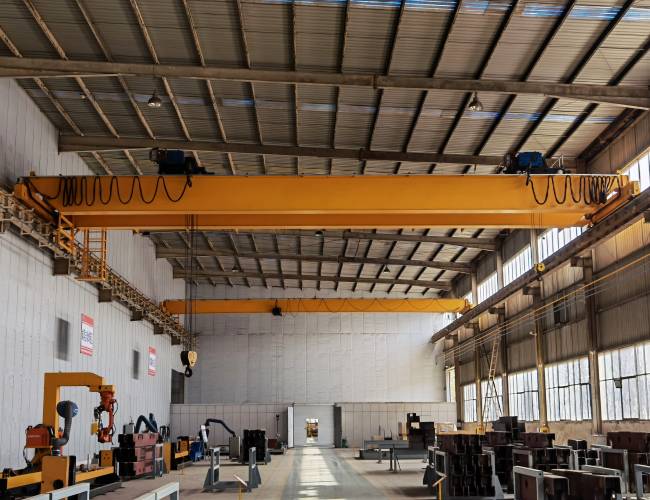In the modern workshop, efficiency is paramount. Whether you are involved in manufacturing, assembly, maintenance, or any other industrial operation, the ability to move heavy materials quickly and safely is essential. Workshop cranes, with their ability to lift and transport loads with precision, are indispensable tools in these environments. However, the integration of advanced technology into these cranes has revolutionized material handling, making operations smoother, safer, and more efficient. This article explores how advanced technology in workshop cranes can streamline your material handling processes and improve overall productivity.

The Role of Workshop Cranes in Industrial Settings
Workshop cranes are typically smaller and more compact than their larger industrial counterparts, making them ideal for confined spaces. Despite their size, these cranes are powerful, capable of lifting and moving substantial loads with ease. They are commonly used in various industries, including automotive repair, metalworking, and electronics assembly, to name a few.
The primary function of a workshop crane is to enhance the safety and efficiency of material handling tasks. Instead of relying on manual labor or makeshift lifting solutions, a workshop crane allows for the precise and controlled movement of heavy objects, reducing the risk of injury and damage. For industrial use, the crane can be underhung style or top running crane style to meet different needs.
Advanced Technology in Workshop Cranes
With the rapid advancement of technology, workshop cranes have evolved from simple lifting devices to sophisticated machines equipped with cutting-edge features. These advancements have not only improved the performance of the cranes but have also introduced new levels of safety, efficiency, and ease of use.
1. Automated Systems
One of the most significant technological advancements in workshop cranes is the integration of automation. Automated systems allow for precise control of the crane’s movements, reducing human error and enhancing safety. For example, automated positioning systems can move the overhead lifting crane to a predetermined location with pinpoint accuracy, minimizing the time and effort required for repetitive tasks.
Moreover, some workshop cranes now feature programmable logic controllers (PLCs) that enable the automation of complex sequences. This technology allows operators to program the crane to perform specific tasks, such as lifting, moving, and lowering loads in a defined order, without manual intervention.
2. Smart Controls
Modern workshop cranes are equipped with smart controls that make operation more intuitive and user-friendly. These controls often include touchscreens, joysticks, and wireless remote controls, allowing operators to manage the crane’s functions from a safe distance. The use of wireless technology not only enhances safety but also increases flexibility, as operators can control the crane from virtually any location within the workshop.
Additionally, smart controls often feature diagnostic systems that monitor the crane’s performance in real-time. These systems can detect potential issues, such as overloads or mechanical wear, and alert the operator before a problem escalates. This predictive maintenance capability helps reduce downtime and prolong the lifespan of the crane.

3. Energy Efficiency
As industries become more environmentally conscious, the energy efficiency of workshop cranes has become a significant consideration. Advances in motor technology and power management systems have led to the development of cranes that consume less energy without compromising performance.
For example, modern electric motors used in workshop cranes are designed to operate with higher efficiency, reducing energy consumption and lowering operating costs. Some cranes also incorporate regenerative braking systems, which capture and reuse energy generated during braking, further enhancing efficiency.
4. Safety Enhancements
Safety is a top priority in any industrial setting, and technological advancements in workshop cranes have led to significant improvements in this area. Many cranes now come with built-in safety features such as load sensors, anti-collision systems, and emergency stop functions.
Load sensors, for instance, can detect when the crane is approaching its maximum load capacity and automatically prevent further lifting, reducing the risk of accidents. Anti-collision systems use sensors to detect obstacles in the crane’s path, automatically stopping the crane to prevent collisions.
Additionally, some advanced workshop cranes are equipped with safety cameras and monitoring systems that provide operators with a clear view of the load and surroundings, enhancing situational awareness and reducing the likelihood of accidents.
5. Data Analytics and Connectivity
In today’s data-driven world, connectivity and data analytics have become integral to the operation of workshop cranes. Modern cranes are often equipped with sensors and IoT (Internet of Things) technology that collect data on various aspects of the crane’s performance, such as load weights, operating times, and maintenance needs.
This data can be analyzed to optimize crane operation, identify trends, and predict maintenance requirements. For example, by analyzing data on crane usage, operators can determine when the crane is most heavily used and schedule maintenance during off-peak times to minimize disruption. Connectivity also allows for remote monitoring and diagnostics, enabling technicians to troubleshoot issues without needing to be on-site. To get a reliable crane machine, it is important to look for and cooperate with a reliable supplier, like Aicrane group. You can get details from the company anytime you need.
Benefits of Advanced Workshop Cranes
The integration of advanced technology into workshop cranes offers numerous benefits that directly impact the efficiency and safety of material handling operations.
Increased Productivity: Automation, smart controls, and data analytics streamline operations, reducing the time required to complete tasks and allowing for more efficient use of resources.
Enhanced Safety: Advanced safety features, such as load sensors and anti-collision systems, minimize the risk of accidents, protecting both operators and materials.
Cost Savings: Energy-efficient motors and regenerative braking systems reduce energy consumption, lowering operating costs. Predictive maintenance and real-time diagnostics also help avoid costly downtime and repairs.
Flexibility and Convenience: Wireless controls and smart interfaces make operating the crane easier and more convenient, allowing for greater flexibility in how and where the crane is used.
Longer Lifespan: Predictive maintenance and real-time monitoring ensure that the crane remains in optimal condition, extending its lifespan and providing a better return on investment.
Conclusion
Workshop cranes equipped with advanced technology have transformed material handling in industrial settings. These cranes not only improve efficiency and productivity but also enhance safety and reduce operational costs. Whether you’re looking to upgrade your existing equipment or invest in a new crane, consider the benefits that advanced technology can bring to your workshop.
By choosing a workshop crane that incorporates the latest technological advancements, you can streamline your operations, protect your workforce, and stay competitive in an increasingly demanding industrial landscape.